Alternative Webex Trunking SIP Routing to Imagicle Queues
Cisco Webex Calling™ Configurations from Control Hub
Imagicle UCX Cloud Suite leverages shared Cisco CUBE (or vCUBE) "Public SBC" deployed in Imagicle Cloud, to allow the Internet "OTT" Peering to Webex Calling MT cloud.
The following configuration procedure applies ONLY while leveraging on-prem PSTN (local CUBE) or Cloud-Connected PSTN. If you are using Cisco Calling Plan, please apply the configuration described here.
Current limitations
Webex Trunking configuration requires a specific Route List license, corresponding to the number of Imagicle Advanced Queuing channels in place. Please check Cisco web site for more details here.
When the call is routed from Imagicle queue to the agent, the originating calling number is lost and the call comes in with Imagicle queue number. This is a Webex limitation, not depending on Imagicle.
While configuring queues in Advanced Queuing Settings, please add
$$QUEUE_TELEPHONE_ADDRESS$$dynamic variable in “Caller Number” field.
SIP Trunk Setup
Please access to Webex Control Hub web portal to define the Secure SIP Trunk which allows to route Advanced Queuing and Auto Attendant calls from Webex Calling to Imagicle Cloud. Please select PSTN & Routing ⇒ Gateway Configurations ⇒ Trunk:
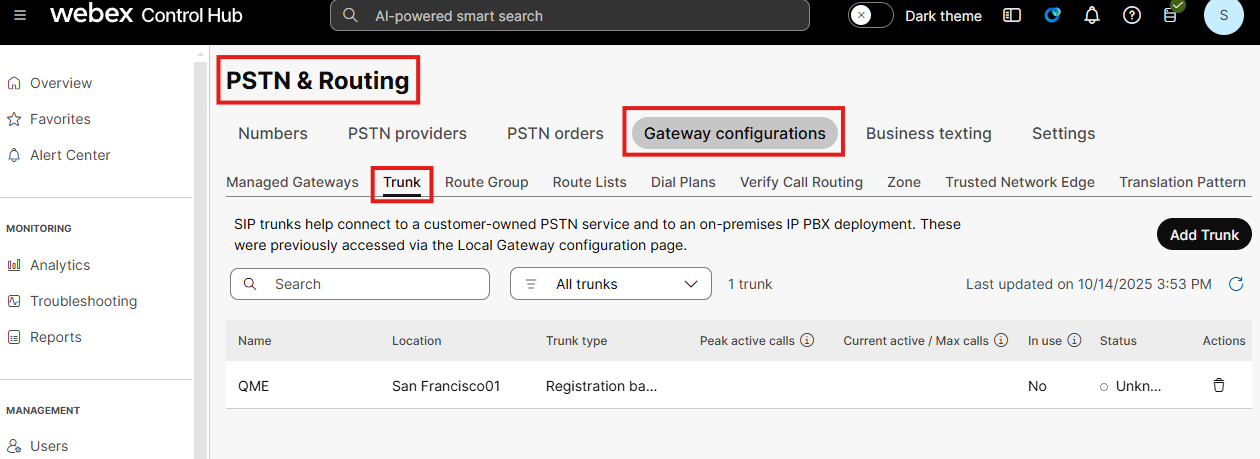
Hit "Add Trunk" and populate the following fields:
Location: select the location where incoming calls for Imagicle Queues/AutoAttendant should land from pull-down menu
Name: enter a name to identify the SIP Trunk. Max 12 characters.
Trunk Type: select "Registration based" from pull-down menu
Dual Identity Support: disabled
P-Charge-Info Support: disabled
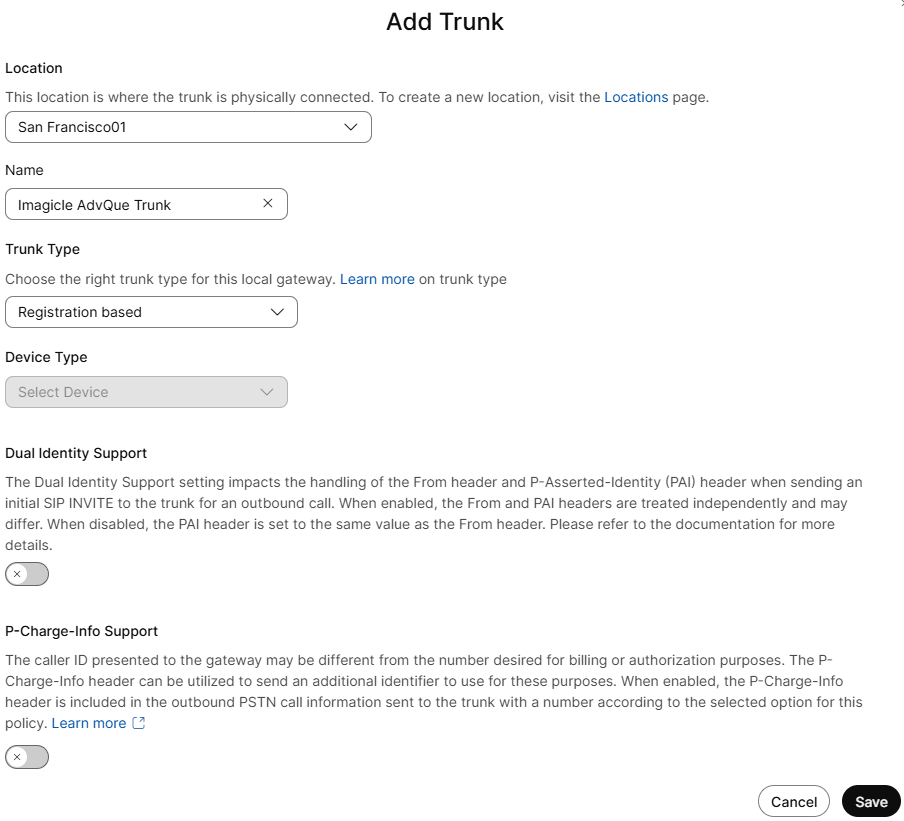
Hit Save to display a Trunk recap page:
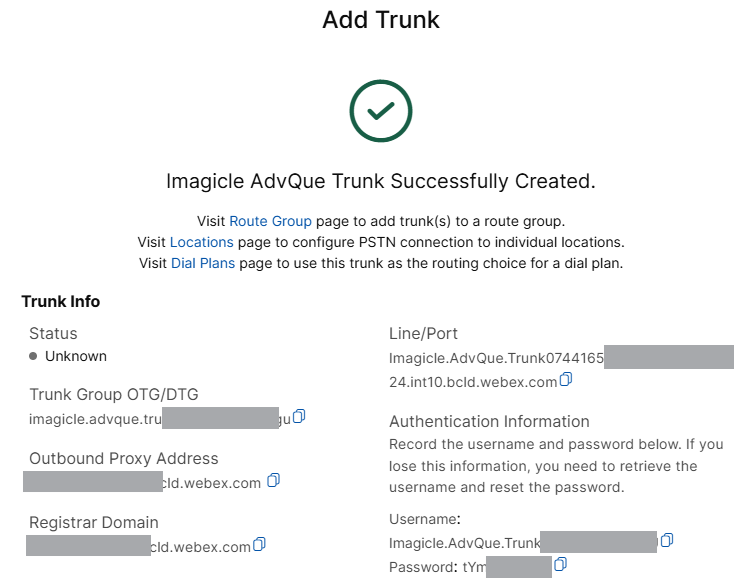
As you notice in above sample, Trunk Status is "Unknown". That's because the destination gateway (Imagicle Public SBC) hasn't been configured yet. Please take note of the following info available in above recap page and send them to wbx.onboarding@imagicle.com:
Registrar DomainTrunk Group OTG/DTGLine/PortOutbound Proxy AddressUsernamePassword
If required for high availability purposes, you can configure additional SIP Trunks within the same Location or in different ones.
Imagicle Public SBC Configurations
Once accomplished above Trunk configuration, Webex Calling Cloud knows that there is an Imagicle UCX Cloud Suite somewhere in Internet and it is expecting to receive at least an "Option Ping" to declare the Trunk online and available.
Public SBC configuration is applied by Imagicle Cloud Services team, based on above Trunk parameters, retrieved in Trunk recap web page.
Once Imagicle CS has applied required SBC configurations, you can go back to Webex Control Hub web portal and check that SIP Trunk(s) are Online: PSTN & Routing ⇒ Gateway Configurations ⇒ Trunk ⇒ Details:
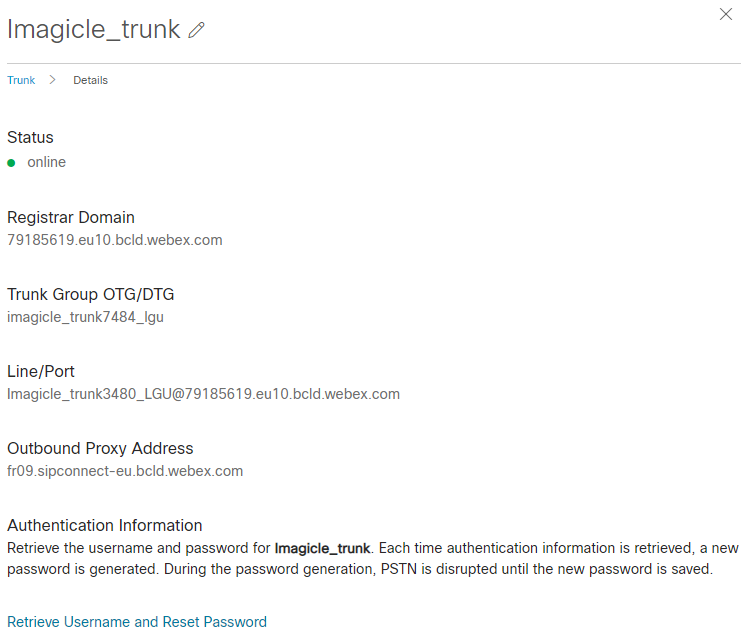
Route Group Setup
One or more SIP Trunks can be associated to a Route Group within Webex Control Hub. Please go to PSTN & Routing ⇒ Gateway Configurations ⇒ Route Group.
Hit Create Route Group button:
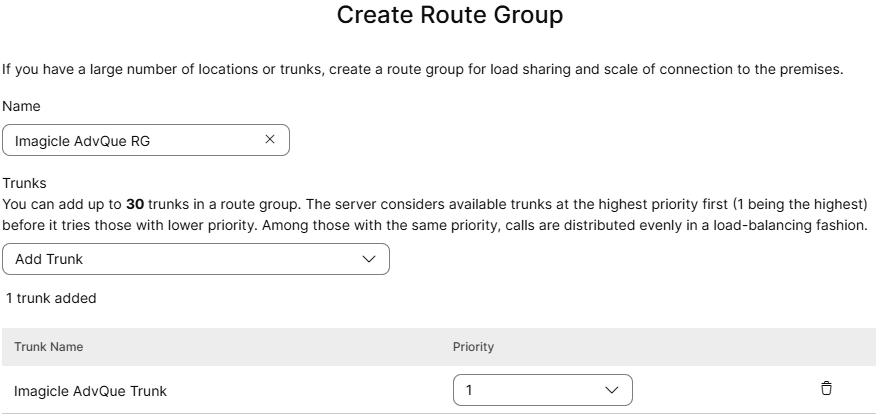
Assign a name of your choice to the RG and start adding one or more trunks, each with a different priority (1 is the highest). Once done, hit Save.
Route List Setup
Route Group must be in turns assigned to a Route List. Please go to PSTN & Routing ⇒ Gateway Configurations ⇒ Route Lists.
Hit Create Route List button:
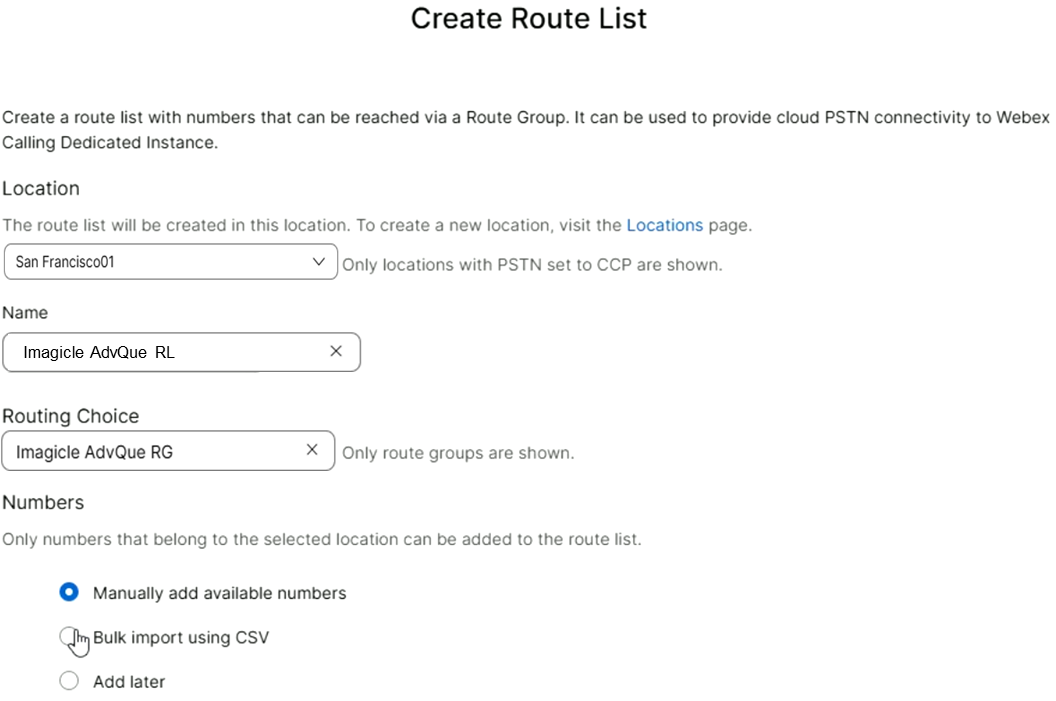
Select the Location from pull-down menu, add a name of your choice to the RL, add previously defined Route Group in Routing Choice and finally select “Manually add available numbers” to choose the PSTN DID to be routed through the Route List.
Once done, hit Create.
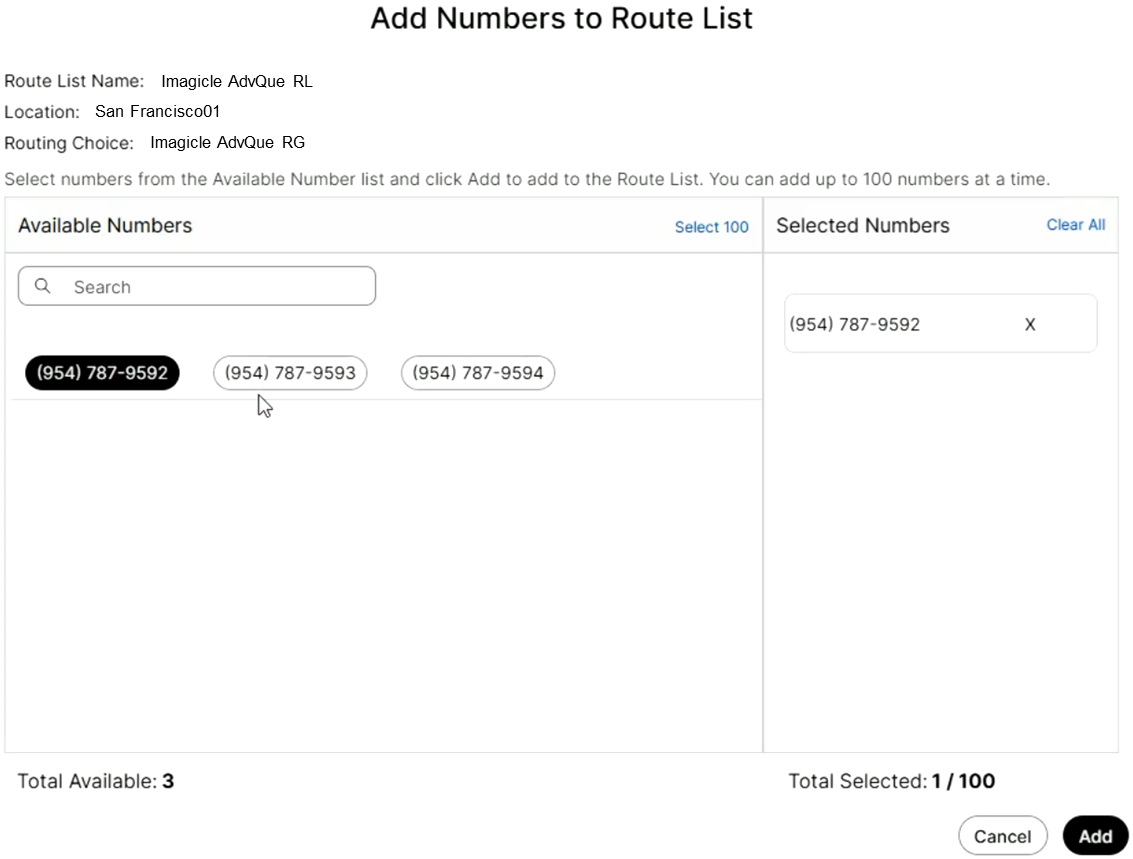
Select the DIDs you wish to route to Imagicle Queues/AutoAttendants.
Bear in mind that each Route List is associated to a single Location. If you need to route PSTN DIDs included in different Locations, then you must define multiple Route Lists by Location.
User's Settings
All Cisco Webex Calling registered users who actually need to leverage Imagicle Advanced Queuing application (as operators or calling/called parties) should have a specific license enablement and an extension number associated to relevant Location.
From Cisco Webex Control Hub, please go to Users Management and click on one specific user to display a License summary:
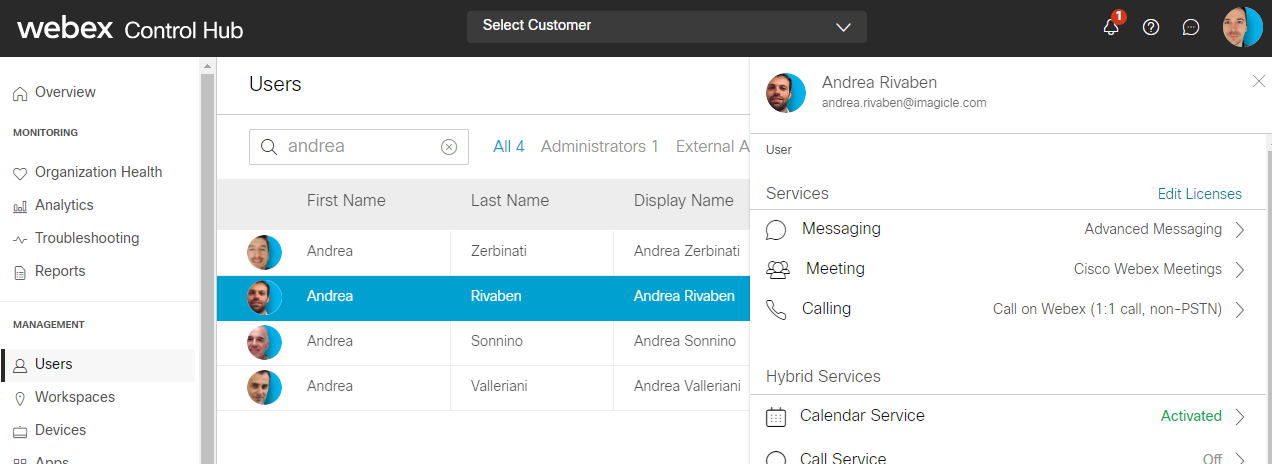
To display and/or amend a user's license, please click on "Edit Licenses":
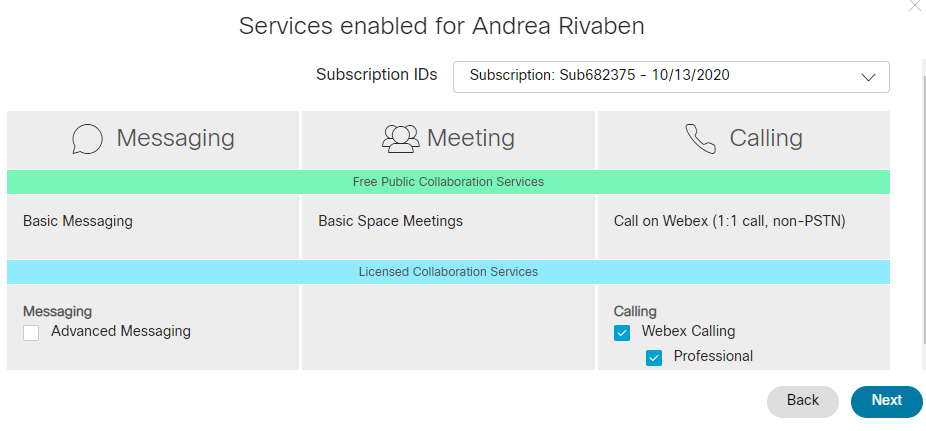
Make sure that both "Webex Calling" and "Professional" flags are checked, then hit Next:

Please make sure that User is properly associated to own Location, with an extension number and +E.164 DID phone number.
